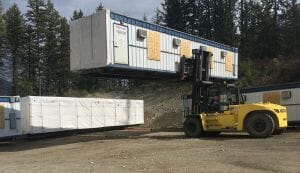ICC/MBI Standards 1200 & 1205 Provide Foundation for Utah's First-Ever State Modular Program
Utah becomes the second state in the country, following Virginia, to fully adopt ICC/MBI standards 1200 and 1205.
What began as a phone conversation in September, 2023, with MBI Government Affairs Director, Jon Hannah-Spacagna and Utah Building Official and State Representative, Tom Peterson, has just turned into an historic accomplishment for the modular industry.
After a call with Rep. Peterson to ask if he would be willing to sponsor a bill that would replicate the modular program that Hannah-Spacagna helped create in Salt Lake City, Rep. Peterson confirmed that he would support a bill at the Utah Housing Summit in October, 2023. The Summit was hosted by Ivory Innovations, a state leader for innovation for affordable housing.
The morning of the Summit, leaders from the state of Utah had a pre-meeting that included Hannah-Spacagna; Ryan Colker, Vice-President of Innovation from ICC; and Cindy Davis, Deputy Director of the Virginia Department of Housing and Community Development that oversees Virginia’s modular program. The group met for more than an hour to discuss the standards upon which Virginia's modular program had been built (ICC/MBI ANSI 1200 & 1205) and how each part was a vital to having a great modular program.

After the Summit, the group, in addition to bill sponsors Sen. Fillmore, Rep. Whyte and their staff, as well as Rep. Peterson, worked closely to create the bill language for Senate Bill 168. MBI members Kam Valsgardson of Irontown Modular, Jeramy Bristol of Advanced Modular, and Rick Murdock of Autovol, all participated in these discussions.
"There were four modular manufacturers involved in the creation of this legislation," said Valgardson. "We were able to go through the draft legislation line-by-line with the rest of the stakeholders, including a housing innovation group, Ivory Innovations, the League of Cities and Towns, MBI and ICC. All were very open to getting this right! The ICC / MBI sections 1200 / 1205 were universally accepted as the authority on modular and the drafting team really only had to add minimal language to suit the legislation for our state's situation. The model code is really the backbone of the entire bill. It was an amazing process, we are very happy with the result."
Additionally, Valgardson and Bristol provided in-person testimony during committee meetings on behalf of the industry. One amendment that we were able to add during the bill passage process was to create an advisory board for the department. This follows a similar structure to the Texas modular program.
"This legislation will now allow for inspections and plan review to happen under the direction of one state agency, rather than 250 local agencies," said Valgardson. "The importance of this benefit to our industry cannot be overstated. It has already brought modular construction to the forefront of the affordable housing discussion and will continue to open doors for our industry in the state of Utah."
"Having an effective, organized, and clear pathway to recognize and approve existing and new modular buildings that are already here and will come here will make all the difference," added Bristol. "It will add safety for our customers, assurance for our AHJ’s, confidence in our product, and equal competition for the industry. All of this will create trust in what we do."
The bill passed the full Senate with a vote of 25-0 and passed the full House with a vote of 68-1. The bill now awaits the signature of the governor.
MBI will continue to work with leadership in Utah to implement the new program once it begins. While part of the omnibus bill will go into effect May 1, 2024, as part of the Governor’s housing initiative, MBI is waiting for more information as to when the modular program will start.
"This was my first real in-depth experience with the creation and passage of legislation," concluded Bristol. "Having knowledgeable, experienced individuals who know the process were integral in helping those who opposed some of our ideas. If you are trying to get this type of program approved, you absolutely need MBI on your side and involved to get it done right. MBI knows our industry, our needs as manufacturers, and how to convey those in meaningful ways during critical times such as implementing new regulations by those not in our industry."
Additional Government Affairs Articles
MBI Solves Relocatable Building Code Issues in Atlanta
A large fleet owner member of MBI was recently delayed in Georgia due to the state’s confusion over the details of the International Building Code. According to the company’s regional general manager, “The feedback we got was, ‘Your plans are not up to date, you need to bring them up to code.’”
Here’s how MBI was able to correct the state’s misunderstanding.
Read Complete ArticleMBI Helps Kick-Start Stalled Plan Review Process
Modular projects in Washington State had ground to a halt. Plan review lead times began stretching into six, eight, even twelve weeks. “Over the summer of 2021, it was getting even longer than that,” says Alan Rasmussen of Modern Building Systems. “By the fall and winter of 2021, reviews were taking 24 weeks.”
Here’s how MBI was able to get things moving again.
Read Complete ArticleCalifornia Governor’s Office Working with MBI on Shipping Container Initiative for Homeless
California Governor’s Office Working with MBI on Shipping Container Initiative for Homeless MBI Government Affairs Director, Jon Hannah-Spacagna, was contacted…
Read Complete ArticleMBI Works with WA Labor and Industries Dept.
MBI Works with Washington State Labor and Industries Department to Adopt Third Party Plan Reviews At the end of August,…
Read Complete Article

